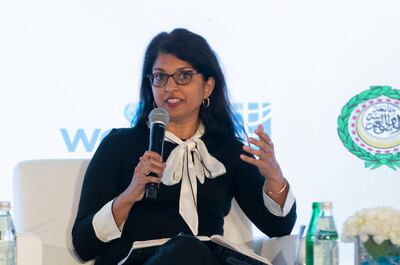Despite international efforts to support Ukrainian women and children affected by the continuing war against Ukraine, activists have said a lack of co-ordination means that few are receiving the assistance they need.
Anou Borrey, senior gender adviser for the UN Development Programme, spoke on the second day of the UN Conference on Women, Peace and Security in Abu Dhabi.
During at a recent trip to Ukraine, Ms Borrey saw that there was urgent need for better co-ordination to provide aid and services to people in need.
She said more than 60 per cent of the Ukrainian population consists of women and children and “we owe it to them to make provisions better available”.
“There is a lot of support by many communities for Ukraine and this is the first time I have seen such an incredible [push] of voluntary support by women, for women,” she said.
The conference, which opened on Thursday, aims to find solutions to support women around the world to uphold the pillars of UN resolution 1325 ― the milestone Security Council resolution on women, peace and security.
Adopted in October 2000, it addresses the effects of war on women and the importance of their full and equal participation in conflict resolution, peace-building, peacekeeping, humanitarian response and post-conflict reconstruction.
During the conference, it was reiterated that only 36 per cent of national action plans put in place to address UN resolution 1325 have allocated budgets.

To date, only 100 countries, of which ten are in the Middle East and North Africa, have strategic national action plans to address the issues highlighted under the resolution.
The UAE was the first country in the GCC to launch national programmes to support the UN agenda of women, peace and security.
Experts at the conference said it remains a challenge to bring about peace and security to women without a global effort.
One year after the Taliban took over Afghanistan, women and girls have effectively been removed from Afghan public life.
Speaking about the need to fight for their rights, Sahana Dharmapuri, director of the Our Secure Future programme at the One Earth Future Foundation, said society had failed them.
“As an American citizen, and my personal view, is that we are [seeing] a huge failing in Afghanistan to uphold the Women, Peace and Security Act,” she said.
“It is our commitment to actually include women in that decision making process.”
She said international agencies and rights groups were doing their best to safeguard Afghan women, but there was a need to look at how to do it more effectively.
Correction: Anou Borrey's comments on Ukraine were originally credited to Zahra Langhi, founder of the Libyan Women’s Platform for Peace, who spoke on the same panel. We apologise for the error.

